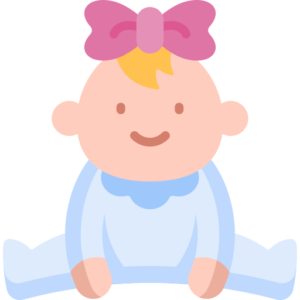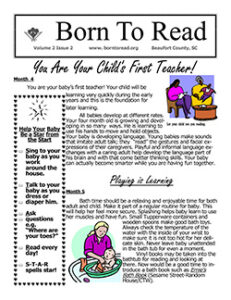Month 4
You are your baby’s first teacher!
Your child will be learning very quickly during the early years and this is the foundation for later learning. All babies develop at different rates. Your four month old is growing and developing in so many ways. He is learning to use his hands to move and hold objects. Your baby is developing language. Young babies make sounds that imitate adult talk; they “read” the gestures and facial expressions of their caregivers. Playful and informal language ex-changes with a caring adult help develop the language part of his brain and with that come better thinking skills. Your baby can actually become smarter while you are having fun together.
Month 5
Playing is Learning
Bath time should be a relaxing and enjoyable time for both adult and child. Make it part of a regular routine for baby. This will help her feel more secure. Splashing helps baby learn to use her muscles and have fun. Small Tupperware containers and wooden spoons make good bath toys. Always check the temperature of the water with the inside of your wrist to make sure it is not too hot for her delicate skin. Never leave baby unattended in the bath tub for even a moment.
Vinyl books may be taken into the bathtub for reading and looking at there. Now would be a good time to introduce a bath book such as Ernie’s Bath Book (Sesame Street-Random House/CTW).
Month 6
Playing to Grow
Your baby’s mental and physical development de-pend a lot on her interactions with you and other family members. Talk to your baby as much as possible in short words and phrases. Repeat the sounds she makes to en-courage her to “talk”. It may not sound like it, but her gur-gling and babbling are the forerunners of speech. When you talk to her, you are exposing her to language, which she learns after lots of repetitions.
As you know, it will be a while before your baby will answer, but her developing brain is listening and absorbing language information just like a sponge.
Fun Activities
If the weather is good enough, take baby out-side for a stroll. Describe for baby the things you see. You could look and talk about the color of the cars that pass, or how the trees or flowers look.
Stand in front of a mirror with baby. Point to his reflection. Then touch and name differ-ent parts of baby’s body as you both look in the mirror. Move closer to the mirror and encourage baby to touch his reflection.
A Time To Share
Your baby will soon be sitting up on his own without need-ing support. He will enjoy the time you share together reading books and may want to hold the book too. Board books are good at this age. They are sturdy enough so that if baby chews or drools on the book little harm is done, and the book can be wiped off easily with a damp rag.
Find a place that is comfortable for both of you and place baby on your lap. Text should be simple with just a few words. Keep extra books around for baby to “read” on his own. Your baby will respond to photographs of other babies, enjoy turning the pages, and love listening to your voice.
Always remember your baby learns language from you or other caring adults. Language is not learned from watching TV, although it may temporarily distract and interest him. The more you talk, sing and read to your baby, the easier it is for him to learn to speak. Learning language is the most important task your baby will do in childhood and you are his most important teacher. Have fun together in this great adventure!
Help Your Baby Be a Star from the Start
- Sing to your baby as you work around the house.
- Talk to your baby as you dress or diaper him.
- Ask questions e.g. “Where are your toes?”
- Read everyday!
- S-T-A-R spells star!
Safety First
Toys and games should always be used by children under the direct and constant supervision of an adult. The toys and games mentioned here are general recommendations only. Proper and appropriate use of toys and games should be determined by each parent on the basis of an individual child’s age and abilities.
Suggested Books for Sharing
- Bill Martin Jr. Brown Bear, Brown Bear, What Do You See?
- Phillip D. Eastman Are You My Mother?
- Marc Brown, ed Hand Rhymes
- Cheryl Christian What Happens Next? Where Does It Go?
Please complete our parent survey and win another book for your baby! We really value your opinions and love to receive pictures of you and your family reading together.
For GED or HS Diploma information call 322 0780 or 322 0781.
Sign up for the Born To Read agency newsletter at http://bit.ly/BTRnews
For information on classes in English for non-native speakers call Literacy Volunteers of the Lowcountry 843 681 6655 (Hilton Head) or 843 815 6616 (Bluffton).
We welcome your comments and suggestions.
Tel: (843) 379 3350
E-mail: borntoreadec@gmail.com
We are a United Way of the Lowcountry Agency


